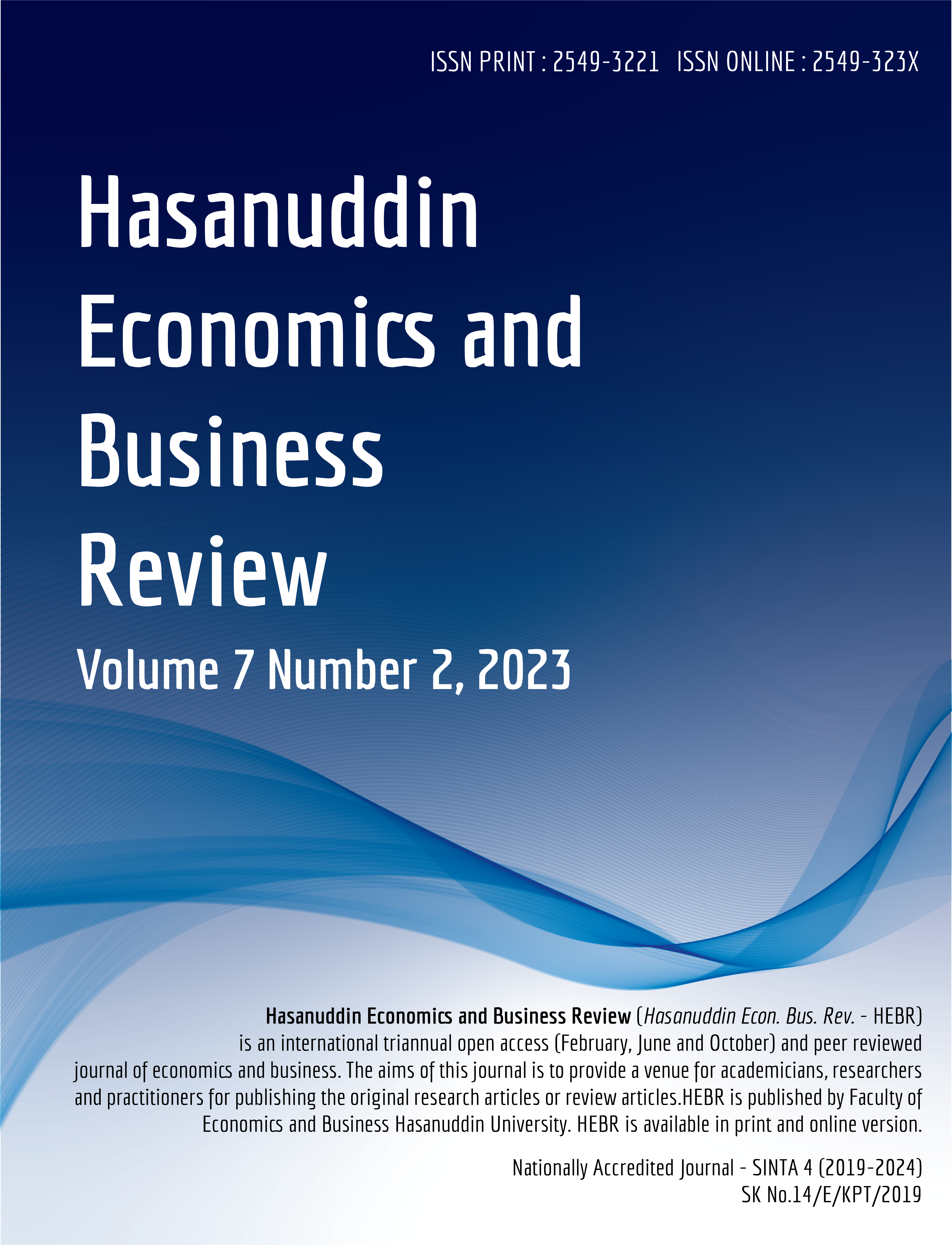Abstract
MSMEs often overlook the presence of financial management, particularly the implementation of appropriate financial management and accounting standards. As a result, financial management becomes a problem for them. Micro business actors often do not know much about accounting and their education also influences their knowledge. This research aims to determine the effect of financial literacy, financial attitudes and personality on financial management behavior among MSMEs in Bengkulu City. The population of this research is MSME entrepreneurs in Bengkulu, with taking 101 samples. To determine the samples, this study uses a random sampling technique. Finally, the research results show that financial literacy effects financial management behavior, financial attitudes and personality with 0.428. In addition, the R Square value is 0.851, meaning that Financial Literacy, Financial Attitude and Personality impact Financial Management Behavior with 85.1%. Independent variables outside the model influence the remaining dependent with 14.9%. Furthermore, MSME actors needs to improve their skills, knowledge and attitude to manage their finances sensibly. A proper financial behavior could rise with possessing an access to all the financial information that may require in order to make financial decisions.References
Amelia, A. (2022). Pengaruh Literasi Keuangan, Sikap Keuangan, dan Kepribadian terhadap Perilaku Pengelolaan Keuangan pada Pelaku UMKM Kelurahan Gedong, Jakarta Timur. Jurnal Maksipreneur: Manajemen, Koperasi, Dan Entrepreneurship, 12(1), 129-143.
Andarsari, P. R., & Ningtyas, M. N. (2019). The Role of Financial Literacy on Financial Behavior. Journal of Accounting and Business Education, 4(1), 24–33. http://dx.doi.org/10.26675/jabe.v4i1.8524.
Ardin, A., & Al Hidayat, R. (2020). Strategi pengembangan UMKM meubel di Kota Bengkulu. Jurnal Akuntansi, Keuangan Dan Teknologi Informasi Akuntansi, 61-78.
Arianti, B. F., & Azzahra, K. (2020). Faktor-Faktor Yang Mempengaruhi Literasi Keuangan: Studi Kasus UMKM Kota Tangerang Selatan. Jurnal Manajemen Dan Keuangan, 9(2), 156-171.
Aribawa, D. (2016). Pengaruh literasi keuangan terhadap kinerja dan keberlangsungan UMKM di Jawa Tengah. Jurnal Siasat Bisnis, 20(1), 1-13.
Atkinson, A., & Messy, F. A. (2012). Measuring financial literacy: Results of the OECD/International Network on Financial Education (INFE) pilot study.
Chen, H., & Volpe, R. P. (2002). Gender differences in personal financial literacy among college students. Financial services review, 11(3), 289-307.
Coskun, A., & Dalziel, N. (2020). Research in Business & Social Science Mediation effect of financial attitude on financial knowledge and financial behavior: The case of university students. International Journal of Research in Business and Social Science, 9(2), 1–8.
Ediraras, D. (2010). Akuntansi dan Kinerja UMKM. Jurnal Ekonomi Bisnis, Vol. 15 (2), 152-158
Estuti, E. P., & Rosyada, F. F. (2021). Analisis Pengetahuan Keuangan,Kepribadian Dan Sikap Keuangan Terhadap Perilaku Manajemen Keuangan. Jurnal CAPITAL, 4(1), 1–14.
Handayani, M. A., Amalia, C., & Sari, T. D. R. (2022). Pengaruh Pengetahuan Keuangan, Sikap Keuangan dan Kepribadian Terhadap Perilaku Manajemen Keuangan (Studi Kasus pada Pelaku UMKM Batik di Lampung). EKOMBIS REVIEW: Jurnal Ilmiah Ekonomi Dan Bisnis, 10(2), 647-660.
Henley, A., 2007. Entrepreneurial aspiration and transition into self-employment: evidence from British longitudinal data. Entrepreneurship Reg. Dev. 19(3), 253–280.
Hidayah, A. N., & Iramani, R. (2023). Pengaruh Literasi Keuangan, Gaya Hidup, Dan Sikap Keuangan Terhadap Perilaku Pengelolaan Keuangan Pada Generasi Milenial Dengan Pengendalian Diri Sebagai Variabel Mediasi. Management Studies and Entrepreneurship Journal (MSEJ), 4(5), 4800-4810.
Humaira, I., & Sagoro, E. M. (2018). Pengaruh Pengetahuan Keuangan, Sikap Keuangan, Dan Kepribadian Terhadap Perilaku Manajemen Keuangan Pada Pelaku Umkm Sentra Kerajinan Batik Kabupaten Bantul. Nominal: Barometer Riset Akuntansi Dan Manajemen, 7(1), 96–110.
Huston, S. J. (2010). Measuring Financial Literacy. Journal of Consumer Affairs, 44(2), 296–316. https://doi.org/10.1111/j.1745- 6606.2010.01170.x
Ida, I., Zaniarti, S., & Wijaya, G. E. (2020). Financial Literacy, Money Attitude, Dan Financial Management Behavior Generasi Milenial. Jurnal Muara Ilmu Ekonomi Dan Bisnis, 4(2), 406.
Ika, A. (2011). Personality traits sebagai penentu perencanaan keuangan keluarga (suatu kajian pustaka). Ragam Jurnal Pengembangan Humaniora, 11(2), 118-126.
Kholilah, N. Al, & Iramani, R. (2013). Studi Financial Management Behavior Pada Masyarakat Surabaya. Journal of Business and Banking, 3(1), 69.
Authors who publish in this journal agree to the following terms:
- The journal holds the copyright for each article published with work licensed simultaneously under a Creative Commons Attribution 4.0 International License, which allows others to share the work with an acknowledgement of the authorship and early publication of the work in this journal.
- Authors must agree to the copyright transfer agreement by checking the Copyright Notice column at the initial stage when submitting the article.

